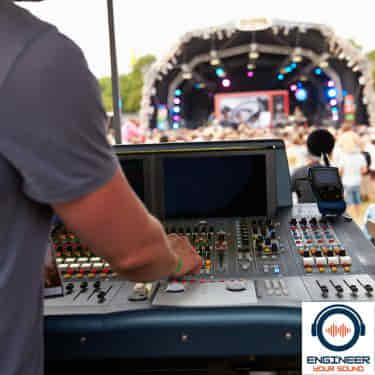Live sound production, an integral component of any successful event or concert, is often considered complex and elusive.
It can seem daunting to many as a discipline requiring a vast knowledge pool and an array of skills. But is it truly as hard as it appears?
Live sound can be challenging due to the need for technical expertise, quick decision-making, and handling unpredictable situations. It requires knowledge of audio equipment, troubleshooting skills, and working well under pressure.
In this article, I aim to demystify the world of live sound, drawing from my experiences as a live sound technician.
I’ll guide you through the responsibilities that come with the role, the pathways to gaining experience, and finally, compare the complexities of learning live sound versus studio production.

Is Live Sound Hard?
The complexity of live sound lies in its dynamic nature. Unlike studio sound, where conditions can be controlled, live sound environments are subject to change and unpredictability.
The venue’s acoustics, the audience’s size, and even weather conditions can drastically affect the sound quality.
As a live sound technician, you must adjust and adapt in real time, often making split-second decisions. Therefore, it’s not so much that live sound is hard; rather, it’s challenging and demands flexibility, quick thinking, and a solid understanding of sound engineering principles.
Despite these challenges, the thrill and satisfaction of ensuring a successful live event can make it all worthwhile.
What Does A Live Sound Technician Do?
A live sound technician, also known as a sound engineer, plays an indispensable role in any live event, whether a concert, theatre performance or corporate gathering.
Their primary responsibility is to ensure the best possible sound quality throughout the event. This involves setting up and operating sound equipment like microphones, speakers, and mixing consoles, performing sound checks and adjusting audio levels during the live show to accommodate the acoustics of the venue and the performers’ preferences.
In addition, they often troubleshoot audio equipment, swiftly identifying and resolving any technical issues that might arise, ensuring that the audience enjoys an uninterrupted auditory experience.
Beyond their technical tasks, sound technicians often liaise with event organizers, performers, and other technical staff, underlining the importance of communication skills in this role.
How Do You Get Experience In Live Sound?
Gaining experience in live sound often starts with learning the basics of sound engineering. This could be through formal education, like a degree or certificate in audio engineering, or self-guided learning using online resources.
Experimenting with your equipment or software can also be beneficial for understanding the fundamental principles.
Additionally, hands-on experience is invaluable in this field. Volunteering for local events, concerts, or theatre productions can provide practical experience in a live sound setting. This is one of the best paths to gaining experience in live sound, as so many local venues and theatres would love a non-paid sound engineer! (Assuming you can volunteer for free)
Internships or apprenticeships at event production companies or music festivals are other excellent avenues to consider. They not only offer hands-on experience but also provide opportunities to learn from seasoned professionals.
Remember, everyone starts somewhere, and even the most experienced sound engineers were once beginners.
So, don’t be afraid to start small and gradually take on bigger challenges as your confidence and skills grow. With time, patience, and practice, you can gain the experience necessary to excel in live sound production.
How Do I Become A Successful Live Sound eEngineer?
Becoming a successful live sound engineer requires a combination of technical knowledge, practical experience, and a few essential soft skills.
Firstly, mastering the concepts of sound engineering is crucial. This includes understanding sound dynamics, knowing the equipment like the back of your hand, and staying updated with the latest audio technologies.
Secondly, practice is key. Be prepared to work on many events, small and large, to gain a diverse range of experiences. Make the most of each opportunity to learn and improve.
Thirdly, problem-solving skills are vital. Live events are unpredictable, and being able to quickly troubleshoot and resolve audio issues is what sets successful sound engineers apart.
Fourthly, good communication and teamwork skills are essential as you’ll frequently interact with clients, performers, and other technicians.
Lastly, a passion for music and sound can make this challenging journey more enjoyable.
Remember, becoming successful in live sound engineering doesn’t happen overnight. It takes time, dedication, and continuous learning. But the rewards of delivering top-quality sound for live events and the joy it brings to the audience make it all worth it.
How Hard Is It To Learn Live Sound Vs Studio?
When comparing the learning curve of live sound to studio sound, one should bear in mind that each comes with its own unique challenges and intricacies.
Studio sound may initially seem less daunting as you generally have more control over the environment and more time for editing and tweaking. However, studio work demands a deep understanding of sound manipulation techniques and an ear for detail to produce high-quality recordings.
Live sound, on the other hand, requires swift decision-making and an adeptness at handling unforeseen circumstances. Despite the ability to rehearse, live situations continuously change, and you are often making adjustments on the fly.
Also, once the event begins, there’s no opportunity for post-production edits. Therefore, while learning studio sound might present a more gradual learning curve, mastering live sound tends to be more demanding due to its unpredictable and immediate nature.
Still, whichever path you choose, keep in mind that persistence, hands-on experience, and a love for sound are key ingredients to mastering both domains.
Do Sound Engineers Make Good Money?
In the field of sound engineering, income can vary widely based on a multitude of factors, including experience, location, and the specific line of work.
Entry-level sound engineers can expect to earn a modest income, but with experience and a solid portfolio, the earning potential increases significantly.
Freelance sound engineers often charge per event or project, and their rates can depend on the complexity of the work involved.
Those employed by event management companies, recording studios, or broadcasting companies usually receive a fixed salary.
According to the Bureau of Labor Statistics, the median annual wage for broadcast and sound engineering technicians was $53,960 in May 2022. [source]
However, top professionals working on major concerts or high-budget films can earn significantly more.
Therefore, while pursuing a career in sound engineering purely for monetary gains might not be advisable, with dedication and persistence, it can certainly provide a comfortable living while allowing you to work in a field you are passionate about.
Is Sound Design And Live Sound The Same Thing?
While both sound design and live sound are critical components of the audio industry, they are not the same.
Sound design refers to the process of creating, recording, and manipulating audio elements. This specialization is often associated with film, television, theatre, and video game production, where the sound designer creates auditory elements that enhance the narrative or gameplay experience.
On the other hand, live sound refers to audio engineering techniques used to amplify and mix sounds for live performances, like concerts or theatre productions. Here, the live sound engineer’s role is to manage the sound quality and balance during the performance in real time, ensuring that the audience gets the best possible audio experience.
Therefore, while both fields require a strong understanding of audio principles and technical skills, the context of their application is distinctly different.
Final Thoughts
The journey into live sound engineering can indeed be challenging, but it is also incredibly rewarding. It requires a combination of technical know-how, hands-on experience, strong problem-solving skills, and a passion for delivering high-quality sound.
Each event presents a unique learning opportunity, and success is built upon continuous improvement and a willingness to adapt and learn.
Whether opting for a career in live sound or studio sound, both are equally demanding and fulfilling in their own ways, with each providing a different set of challenges and rewards.
Therefore, if you are passionate about sound and willing to dedicate the time and effort to learn, a career in sound engineering offers a fulfilling path.
Remember, the joy of delivering excellent sound at live events and the ability to touch audiences’ lives through audio makes all the hard work worth it.
